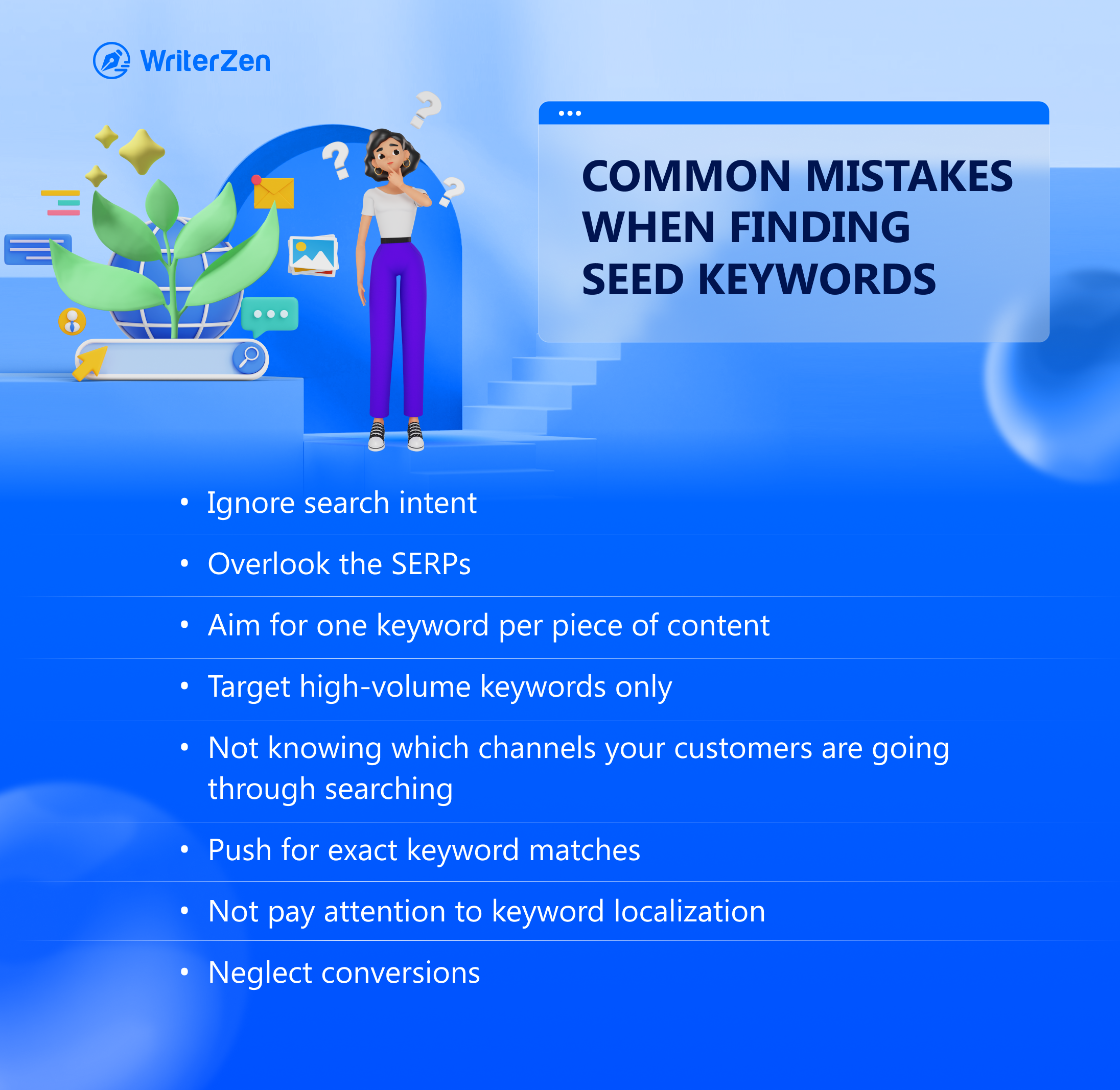Seed Keywords are needed for the basis of successful SEO. Investing time in developing a solid list of seed keywords can serve as the cornerstone for effective keyword research, often leading to exceptional results within the keyword output system.
We will discuss the importance of seed keywords, tips for deciding which seed keywords will best suit your needs, and common mistakes individuals often make regarding seed keywords and how they should be used.
What Are Seed Keywords?
Seed keywords can serve as the initial point in keyword research, allowing for the discovery of additional related keywords. Seed keywords typically consist of one or two words and belong to the category of short-tail keywords. Like short-tail keywords, seed keywords are not modified and remain simple word phrases. They are the building blocks for any website.
By inputting these into a tool like WriterZen’s Keyword Explorer and accessing a keyword ideas report, millions of possible keywords can be generated for your convenience.
Once you have identified some pertinent seed keywords for your website, you can use modifiers to expand on them and generate more keyword ideas.
Why Are Seed Keywords Important?
Seed keywords are important because they form the basis of your keyword research and provide a starting point for identifying potential topics and phrases that your target audience is searching for.
By identifying seed keywords, you can uncover a range of related keywords that you may not have thought of otherwise, which can help you optimize your content for search engines and attract more traffic to your website.
In other words, seed keywords are crucial for building a solid keyword strategy that can help you rank higher on search engine results pages and reach your desired audience.
Tips for Finding and Choosing Seed Keywords

Generate Different Variations of Your Intended Keyword through Brainstorming
Your brain can often be the most valuable tool in certain situations, such as searching for seed keywords.
To begin, generate a list of apparent variations and synonyms for the keyword you are examining. These tools can assist in identifying potential keywords but may overlook essential and relevant terms that only human intuition can recognize.
Using your brain to develop initial seed keywords can increase the chances of discovering valuable search terms that automated tools may have missed.
Conduct Competitor Analysis through Reverse Engineering
If you require inspiration and need to be better-versed in the industry, examining the keywords for which related websites rank can be helpful. By analyzing the keywords your competitors and other websites in your niche are using, you can obtain insights into the terms commonly searched for in your industry.
This can provide a starting point for your keyword research and help you identify valuable search terms you may have overlooked.
Look at the Google SERPS
Search Engine Results Pages (SERPs) are an excellent source of information. One of the best ways to gain insight into the keywords relevant to your industry is by searching for your seed keyword ideas and exploring the search results. This approach can help you identify new keyword opportunities and expand your list of seed keywords.
Once you have entered your seed keyword into Google, there are a few things to look out for. Firstly, the "People Also Ask" (PAA) boxes are a valuable feature of Google SERPs. These boxes directly answer questions about a search query from relevant web pages.
Examining the recurring terms in the PAA boxes allows you to uncover new seed keywords that may not have been on your radar previously. Additionally, Google provides clickable links to the sources, allowing you to explore the web pages currently ranking for these terms.
In addition to PAA boxes, you can also scan the search results pages for potential seed keywords. By analyzing the content of the top-ranking web pages, you can discover keywords and phrases associated with your seed keyword.
Examine Community Forums and Reviews
One of the most valuable sources of information is your target audience. To effectively explore this avenue, it is essential to understand where your audience spends their time online. Doing so lets you gain insights into the language and search terms relevant to your target demographic.
Some online resources to consider when searching for seed keywords:
-
Blog comments: Start by reading the comments and questions left on industry-relevant blog posts. This can help you uncover new keywords and phrases your audience uses to describe their needs and pain points.
-
Social media: Explore niche social media groups and read through posts, comments, and polls to identify common themes and language. This can give you ideas for new keywords and content topics.
-
Niche forums: Search for industry-specific forums and read through the discussions to see what topics are trending and what questions are being asked.
-
Online communities: Check out online communities such as Quora and Reddit and read through the questions and comments related to your industry. This can help you identify new keywords and content ideas.
-
Help and support: If you can access customer support tickets or help documentation, read through them to see your audience's questions and concerns. This can provide valuable insights into your audience's language and terminology to describe their problems.
By leveraging these online resources, you can better understand your target audience and discover new seed keywords to include in your keyword research.
Create a List of Products, Brands, and Services Related to Your Potential Keywords
Listing related products/services can easily help find seed keywords. To do this, Google and explore niche-specific sites. Try these methods:
-
List posts: Google [seed keyword] + "brands" and take note of brand terms in listicles.
-
E-commerce sites: Visit niche-specific stores and examine product categories/subcategories.
-
Affiliate posts: Google "best" [seed keyword] and identify promoted products.
Common Mistakes

-
Ignore search intent: Failing to understand the intent behind users' search queries can lead to targeting keywords that don't align with what they are looking for.
-
Overlook the SERPs: SERPs offer insights into the competition level, featured snippets, and related search terms. Neglecting this analysis can result in targeting highly competitive keywords with little chance of ranking.
-
Aim for one keyword per piece of content: This can restrict your reach and potential rankings. Instead, incorporating related keywords and variations within your content can help you target a wider range of user search queries while maintaining relevance and maximizing efficiency.
-
Target high-volume keywords only: Relying solely on high-volume keywords can make it difficult to rank, what with the intense competition, especially for newer websites. Balancing high-volume keywords with long-tail keywords can help target a more specific audience and increase conversion rates.
-
Not knowing which channels your customers are going through searching: Different platforms, such as search engines, social media, or industry-specific forums, may require different keyword strategies. Tailoring your keywords to target specific channels can increase visibility and reach.
-
Push for exact keyword matches: Search engines have become more sophisticated in understanding user intent, reducing the need for exact keyword matches.
Over-optimizing for exact matches can result in unnatural content that hampers user experience. Instead, focus on creating valuable content that addresses user intent and incorporates related keywords.
-
Not pay attention to keyword localization: If your business operates in specific regions, it's crucial to localize your keywords. Incorporating location-specific keywords helps target users in a particular area and can improve local search rankings and visibility.
-
Neglect conversions: While keyword rankings are important, the ultimate goal of SEO is to generate conversions and revenue. Choosing seed keywords that align with your conversion goals is essential.
Final Thoughts
Compiling a roster of seed keywords provides a solid groundwork to begin your keyword exploration. Although seed keywords cannot replace effective keyword research, they can enhance the likelihood of discovering more applicable phrases.
















